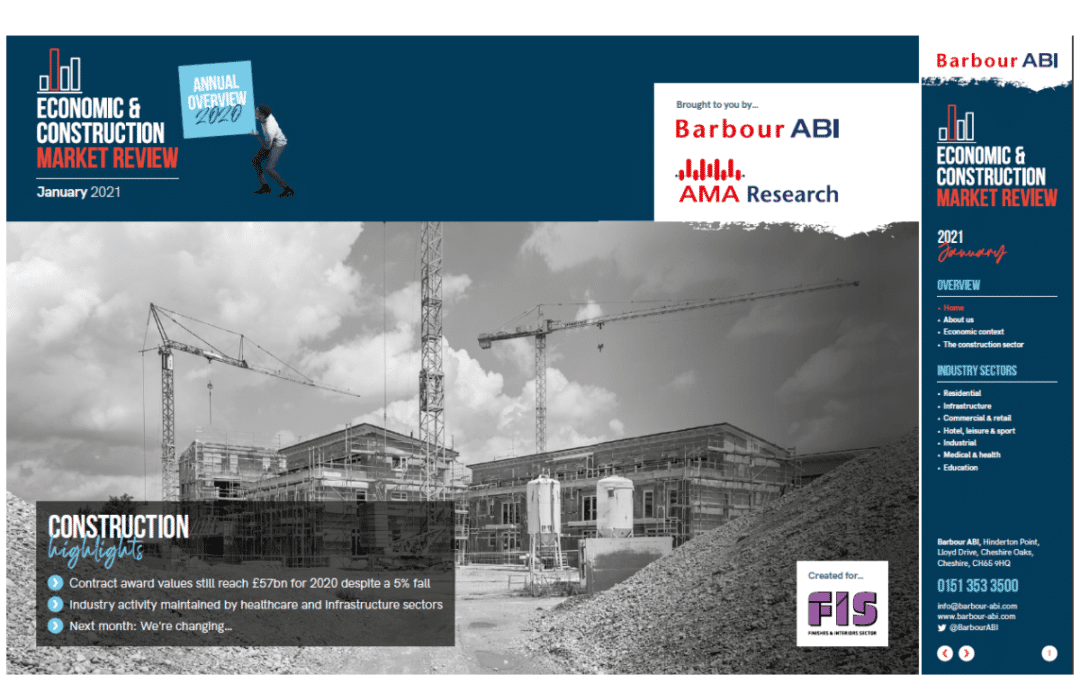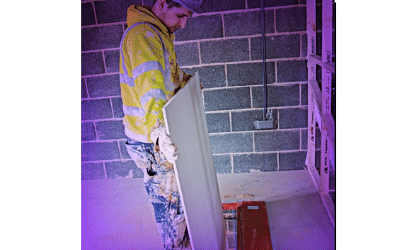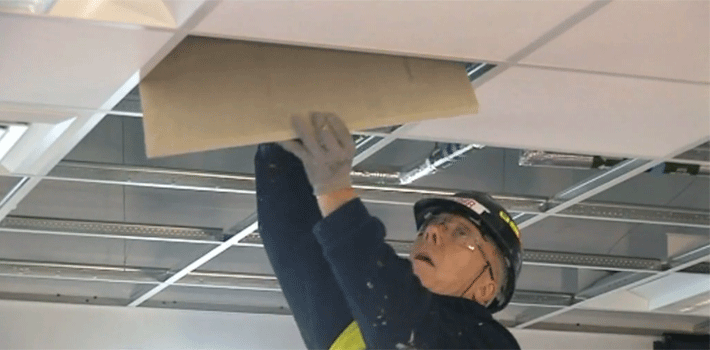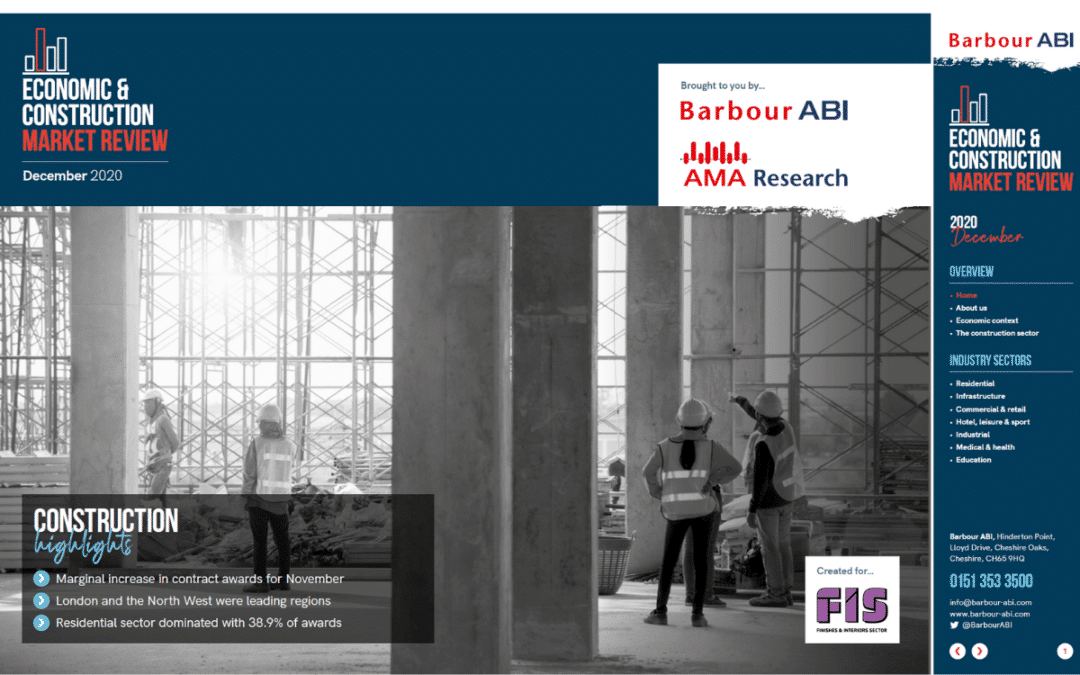
by Clair Mooney | Jan 25, 2021 | Membership
The FIS Site Guide for Suspended Ceilings has been revised and updated by the FIS Ceilings and Absorbers working group and is available to download here.
The site guides are intended to help main contactors, designers and project managers that you are working with to understand the terminology, descriptors and different ceiling systems used, and the process of delivery, handling, planning the installation, as well as understanding the site conditions, the plant and access equipment needed. It also highlights the key health and safety points and requirements from the Construction (Design and Management) Regulations 2015 (CDM).
The guide sits alongside our other best practice guides that relate to ceilings:
These guides work well when they are included in proposals and project plans to demonstrate how you will approach a project, they are also good differentiators when you find yourself in competition with non-members and are an excellent introduction to new members of the team and any trainees and apprentices.
The next online meeting of the Ceilings and Absorbers working group will be held on 2 March. To register please follow this link, or call Joe Cilia on 07795 958 780 if you have any questions.

by Clair Mooney | Jan 25, 2021 | Membership, Skills
The FIS Training Group has secured additional funding to support the cost of training and qualifications completed by FIS employer members in scope to CITB.
The additional funding, of up to £2,000 per company, covers a range of training from generic health and safety through to specialist courses such as spray plastering, deflection heads or fire door inspection and includes vocational qualification achievement. This funding is in addition to the CITB grant eligible training (GET) code grant you already claim from CITB.
How to claim
Simply send the invoice for training completed since 1st August 2020 to info@thefis.org if it meets the criteria set out below, we will arrange a refund to the full 100% of the course cost (up to a maximum of £2,000 per company, less the grant already claimed from CITB and less VAT incurred). The funding will be available on a first come, first served basis.
For a full list of eligible courses please see: CITB training standards
CITB GET Fund FIS Supplement Terms and Conditions
- The supplement cannot be used for GET codes that are already included on an individual employer contracted CITB Skills and Training allocation.
- An FIS supplement can only be paid to organisations ‘in scope’ to CITB and up to date with levy payments.
- The supplement is primarily for micro and small organisations no more than 25% of the total fund can be paid to large organisations (100 or more employees).
- Non grant eligible training is not covered by this supplement.
- Training must have taken place between 01 August 2020 and 31 March 2021 and have been completed before applying.
- Training must have been completed by delegates who are currently employed by or are NET (taxed) Construction Industry Scheme (CIS) sub-contractors of CITB registered employers.
- Invoices supplied must show the full costs of the training completed including CITB registration number, Training Provider, course name, CITB GET code, Tier value, date of completion, number of delegates, course cost and VAT.
- Successful applications will be notified within 25 working days.
- Payments will be made when the invoice is verified.
Funding is limited so cannot be guaranteed.
FIS is happy to review and support all of your funding claims through our one to one Skills and Funding Clinics.
This is a service freely available to members through the booking form here. Members are also strongly advised to apply for the CITB Skills and Training Fund 2020 which can allow organisations to claim up to £25,000 to support their training needs.

by Clair Mooney | Jan 25, 2021 | Building Safety Act, Skills
FIS has launched Career and Competency Pathways ways as the first in a structured approach to defining competency and career paths within the Finishes and Interiors Sector.
The new Framework is built on the principles of the FIS Competency Skill, Attitude, Knowledge and Experience (SAKE) Framework and provides an example of how an individual can progress in a finishes and interiors occupation. It is designed to help companies manage competency in the face of intense scrutiny and new requirements coming into force through the Building Safety Bill. The Framework provides some standardisation and lays down clear criteria to assess and prove competence at every level of the workforce.
Commenting on the launch of the Pathways, FIS Skills and Training Lead George Swann said: “The Pathways brings a structured approach to career management based on the development of skills, knowledge and building experience. It aims to support and encourage career progression by passing defining competency gateways based on measured outcomes and linking this back to qualifications and training available. Our hope is that this makes it easier for everybody – new entrants, experienced workers, supervisors and managers – to follow how individuals progress within our sector and understand how to nurture and demonstrate competence.”
The Pathways looks at both formal and informal training requirements. Whilst formally recognised qualifications form the bedrock of progression through an occupation and are the criteria for CSCS card registration, these are not the only measure of competence. At each step in a career progression, the matrix suggests informal training that may support individual and organisational needs.
For new entrants to the sector, embedded in the matrix are details of apprenticeships delivered in each of the home nations. All listed training, qualifications and apprenticeships are available through the FIS Approved Training Provider Network.
“As a guide the matrix proposes ‘normal time frames’ based on the maximum formal qualification completion times or Total Qualification Times, but recognises individuals learn at different rates, so these may not always be applicable. Attitude and opportunity may move people through a career faster than others, but at each stage proof of competency is vital,” added George Swann.
Initial work has taken place on Drylining and Ceiling Fixing Pathways and FIS aims to launch further frameworks to cover the core occupational areas within the £10 billion finishes and interiors sector workforce in the coming months.
For more information and to view the Career and Competency Path click here
For more information on FIS Skills and Competency Work visit our the FIS Skills Hub

by Clair Mooney | Jan 24, 2021 | Skills
HSE have made sure that you will still have a direct dialogue with their experts, a high level of interaction with the other attendees, and lots of opportunities to ask questions. Printed course material will be delivered direct to your door.
Upcoming courses include:
View HSE full course schedule

by Clair Mooney | Jan 22, 2021 | Skills
National Apprentice Week is fast approaching and will run from 8 to 14 February 2021. It provides an opportunity for organisations to showcase the contribution they are making to the future finishes and interiors workforce and society. The Week can provide a platform to come together and celebrate apprenticeship journeys and successes as well as to say ‘Thank You’ to everyone who makes them possible.
How to get involved
“Build the Future” is the theme for NAW2021 and the core focus is to encourage everyone to consider how apprenticeships help individuals to build the skills and knowledge required for a rewarding career. Key to this is positive stories, if you are thinking about taking on an apprentice in the finishes and interiors sector, have an apprenticeship success story (either yourself or someone you supported with an apprenticeship that has flourished in your business) please contact the FIS Team.
For the very first time, National Apprentice Week is entirely based in a digital world. From virtual career fairs through to factory tours. There will be personal stories from apprentices and employers about their own journeys and experiences and why apprenticeships help to #BuildTheFuture.
You can also join in the conversation with the #AskAnApprentice or #AskAnEmployer sessions to help employers, potential apprentices, teachers and parents understand the real benefits of apprenticeships.
Thinking about taking on an Apprentice
FIS has a raft of information on Apprenticeships, including our Guidance for Employers. If you have plans for National Apprentice Week or have a story that you want to share/tell, please get in touch so we can share via SpecFinish and our Social Channels.
Alternatively give us a call on 0121 707 0077 or email info@thefis.org – we will be happy to help.
Positive stories from the Finishes and Interiors Sector
Find out how FIS Member EE Smith are making apprenticeships work and riding high (the highest placed construction company) in the UKs Top 100 Apprentice Employers.
Find out more about some of the amazing apprentices who have been recognised through the FIS Fit-Out Futures Awards.
For updates during the week follow FIS on Twitter or FIS on Linkedin
Events during National Apprentice Week
Hold the date: Wednesday 10th February Midday, FIS is hosting a dedicated webinar focussed on support for apprentices.

by Clair Mooney | Jan 21, 2021 | Market data, Membership
Increases in contract awards in the North West, East of England and the South West.
Contract awards in the commercial sector valued £7.3bn, 4% lower than 2019’s £7.6bn. The number of projects fell by 17% to 1,100 from 1,400. This is broadly consistent with preceding years and continues the long negative trend in the sector.
The sector experienced a major shock this year with a huge increase in home working leaving offices unoccupied and retail stores shuttered for much of the year resulting in a surge in online purchases by consumers.
FIS members can access the full report here.
Total number of contract awards decrease by 16% in 2020 and values fall by 5%.
Construction output increased by 2% in November, bringing the in-month value above pre-Covid levels for the first time. This was achieved through strong infrastructure activity, as well as repair & maintenance activity across all sectors. Private housing was also strong in November and continued its upward trajectory since the summer.
However aggregate output for 2020 remained significantly down on 2019. Housing has taken the largest hit, at 20% below last year’s levels – public housing especially is down, by 28%. The industrial and commercial sectors are 18% and 17% lower respectively. The sectors least impacted are infrastructure (-3%), RMI (-5%) and public non-housing (-7%).

by Clair Mooney | Jan 21, 2021 | Membership
The director of a construction company has been sentenced after a subcontractor suffered serious injuries when a stack of plasterboards fell on him at a construction site in Thames Ditton, Surrey.
Brighton Magistrates’ Court heard that on 12 April 2019, subcontractors were moving sheets of plasterboard weighing 32kg each from the ground floor to the second floor of a house undergoing refurbishment. As there was no staircase in place, they were stacking the plasterboard against an unsecured ladder and sliding them up to the floor above. During the process the plasterboards fell on the worker, fracturing his pelvis.
An investigation by the Health and Safety Executive found there was no safe system of work in place and the workers were not being adequately supervised. The stairwell openings were not guarded and they were partially spanned with scaffold boards resting on insecure scaffold poles, creating a significant fall risk.
Siamak Samyani the sole director of SS Reforms Limited of Eastcote Avenue, West Molesey, Surrey pleaded guilty to breaching Section 37 of the Health and Safety at Work Etc Act 1974. He was sentenced to 20 weeks in custody suspended for 12 months, fined £3,400 and ordered to pay costs of £600.
Speaking after the hearing, HSE inspector Andrew Cousins said: “This was a wholly avoidable incident, caused by the failure of the director to devise and implement a suitable safe system of work.
“Companies should be aware that HSE will not hesitate to take appropriate enforcement action against those who fall below the required standards.”
FIS has created a guide for the Safe Ingress of Plasterboard, which is available to download here.

by Clair Mooney | Jan 21, 2021 | Main News Feed
All homes and businesses will have to meet rigorous new energy efficiency standards to lower energy consumption and bills, helping to protect the environment, the Housing Minister Chris Pincher has announced.
Responding to a consultation on the Future Homes Standard, the government has set out plans to radically improve the energy performance of new homes, with all homes to be highly energy efficient, with low carbon heating and be zero carbon ready by 2025.These homes are expected to produce 75-80% lower carbon emissions compared to current levels. To ensure industry is ready to meet the new standards by 2025, new homes will be expected to produce 31% lower carbon emissions from 2021.
Existing homes will also be subject to higher standards – with a significant improvement on the standard for extensions, making homes warmer and reducing bills. The requirement for replacement, repairs and parts to be more energy efficient. This includes the replacement of windows and building services such as heat pumps, cooling systems, or fixed lighting.
Housing Minister Rt Hon Christopher Pincher MP said:
Improving the energy performance of buildings is vital to achieving net-zero emissions by 2050 and protecting the environment for future generations to come.
The radical new standards announced today will not only improve energy efficiency of existing homes and other buildings, but will also ensure our new homes are fit for the future, by reducing emissions from new homes by at least 75%.
This will help deliver greener homes and buildings, as well as reducing energy bills for hard-working families and businesses.
The government plans also include measures to tackle;
- Ventilation – a new requirement for additional ventilation and indoor air quality monitoring in high-risk non-domestic buildings such as offices and gyms, reducing the risk of any potential infections being spread indoors.
- Overheating in residential buildings – a new overheating mitigation requirement in the Building Regulations.
There will be stringent transitional arrangements in place to provide all developers with certainty about the standards they are building. These will last for one year and apply to individual homes, rather than an entire development.
The government has also announced a consultation on higher performance targets for non-domestic buildings which will mean they will be zero carbon ready by 2025.
Taken together these measures will help to lower the cost of energy bills for families, while helping to tackle our climate change goals.
The government is committed to reaching net-zero and is taking considerable action to address the emissions from buildings – with heating and powering buildings currently accounting for 40% of the UK’s total energy usage.
There has already been considerable progress made on emissions from homes, with overall total emissions reduced by about a fifth since 1990 despite there being approximately a quarter more homes.
In 2019 the government introduced a legally binding target to reduce greenhouse gas emissions to net zero by 2050 – making the UK the first major economy in the world to legislate a zero net emissions target. The measures announced today recognise the important role that the energy efficiency of buildings can play in achieving this goal.

by Clair Mooney | Jan 21, 2021 | Skills
The Institute announced its plans to move to a simplified EQA system in August 2020. The changes will see EQA delivered by Ofqual or, for integrated degree apprenticeships, the Office for Students (OfS).
The Institute is now setting up a new group of professional and employer-led organisations – called the Employer Directory – for Ofqual and OfS to draw on industry expertise.
We want as many sector representative bodies as possible to apply and support us with real industry insight. This will keep employers at the heart of protecting quality in apprenticeships. Please share the Institute’s employer directory page with your networks and across your social media channels.

by Clair Mooney | Jan 20, 2021 | Market data
Construction bouncing back despite W-shaped recession and recovery
The CPA’s latest Construction Industry Scenarios sees a ‘W’-shaped economic recession and recovery as its main assumption, with construction output expected to rise 14% in 2021 and 4.9% in 2022. This takes into account the new lockdown restrictions over winter 2020/21 before a sustained recovery from 2021 Q2 as vaccines are rolled out and the services-based economy can reopen again. While some sectors of construction are dependent on consumer and business confidence returning, construction activity has largely been able to bounce back quicker than the overall economy.
With government making it clear that the construction and manufacturing sectors should continue to operate despite Covid-19 restrictions, output has been able to rise and recover relatively rapidly. The 14.0% rise in 2021 follows an estimated contraction of 14.3% overall in 2020 caused by the sharp fall in the first half of last year. It should be noted, however, that output is only expected to recover to pre-Covid levels in 2022. There is also the risk that once the furlough and self-employment support schemes end in April, there may be a sharp rise in unemployment that could potentially dampen this recovery.
The CPA’s Scenarios show that private housing was one of the quickest sectors to recover in 2020, with mortgage lending and property transactions above pre-Covid levels at the end of the year. Pent up demand as well as the government’s stamp duty holiday and the end of the first phase of Help to Buy largely drove the recovery in this sector. Demand for private housing is expected to moderate in 2021 after these policies end on 31 March and then subsequently pick up once again in line with the economic recovery throughout late 2021 and 2022.
A slower recovery has been seen in the commercial sector, with store closures and low rent collection in retail and leisure as well as the shift to working from home causing uncertainty for the offices sub-sector. Recovery in 2021 and 2022 is further constrained by the long-term shift to e-commerce in retail, which is likely to have been accelerated by consumers switching to online purchasing during the pandemic. The ongoing question of whether the shift to homeworking will continue after the vaccines are rolled out will be crucial to determining demand for offices space.
Homeworking has on the other hand had a positive impact on the private housing RM&I sector, with households investing accumulated savings from lower daily expenditure back into homes. Although the trajectory for future demand is dependent on labour market conditions as job support schemes end in April, the extension of the government’s Green Homes Grant may help to boost activity. For public housing, a backlog of cladding work is expected to drive activity in RM&I in 2021 and 2022 as the Building Safety Programme moves beyond the removal of Aluminium Composite Material.
Commenting on the Winter Scenarios, the CPA’s Economics Director, Noble Francis, said: “The spectre of a ‘No Deal’ Brexit that would have badly affected the UK economy and construction in the short term has been avoided but questions over the long term impact of Covid-19 on the structure of the economy still remain. This continues to leave questions about the fortunes of certain construction sectors. This is most notable in the commercial sector, where there is still lots of uncertainty about the future of retail and office space. It will be crucial to observe how businesses change their operations as the vaccine is rolled out in the coming months and to what extent there is a ‘return to the office’.
“While the fortunes of some sectors have been tied to Covid restrictions and associated business and consumer confidence in the wider economy, infrastructure has largely escaped such uncertainty. Projects have been able to effectively enact safe operating procedures given the sector’s large construction sites that have fewer different trades mixing than in most sectors. As such, infrastructure has been least-affected by Covid restrictions and output is expected to lift the whole industry over 2021 and 2022. Main works on HS2, Europe’s largest construction project, along with offshore wind and nuclear projects are expected to be the main drivers of activity.”

by Clair Mooney | Jan 20, 2021 | Skills
There is a demand for people with occupational expertise to become vocational and end point assessors for finishing and interiors occupations. More colleges and independent training providers are now preparing to deliver apprenticeships and other training programmes for Dryliners, Ceiling Fixers, Partition Installers and Plasterers, people with experience are now required to pass on their skills and knowledge to the next generation of operatives.
If you feel you have reached that point in your career when it’s time to give something back, vocational and end point assessment is definitely worth considering. You will need good interpersonal, administrative and organisational skills and the more occupational experience you have the better you will be equipped to assess an individual’s skills and knowledge. Being a part of people’s development and witnessing their success is very rewarding. If you are interested please visit https://www.nwskillsacademy.co.uk/ or call 0161 442 4344.
George Swann FIS Skills and Training Lead said:
“Becoming an assessor can be a secure and rewarding career choice and the opportunity to shape the next generation of talent. It is a key role in the success of the sector, helping new entrants to gain their qualifications and become highly skilled in their trade. This is a fantastic opportunity for experienced industry professionals to use their skills and knowledge in a new capacity and FIS encourage you to find out more. The continuing shortage of skilled labour will not be address without good quality training and assessment”.
Further information can be found at
NOCN Level 3 Award in Assessing Competence in the Work Environment – NOCN and Become an End Point Assessor
https://www.cityandguilds.com/search?n=0&q=end+point+assessment&s=relevance
If you would like to talk through the requirements of this role contact the FIS by calling 0121 707 0077 or emailing info@thefis.org. The success of new entrants to the sector and therefore the longevity of the skills is reliant on dedicated competent assessors.

by Clair Mooney | Jan 15, 2021 | Building Safety Act, Main News Feed
The Welsh Government has published its long awaited consultation on Safer Buildings in Wales. The documentation can be viewed here.
The White Paper sets out proposals for the comprehensive freeform of legislation that contributes to building safety in Wales. It focuses on legislative changes across the lifecycle of buildings aimed improving safety and minimising the risk of fire as well as setting out aspirations for cultural change in the way buildings are designed, constructed and managed.
The consultation proposes clear lines of accountability by creating new roles and responsibilities to those who own and manage relevant buildings. It will also provide a stronger regulatory system to hold those responsible to account. Residents will have enhanced rights and a stronger voice on matters affecting their homes.
The consultation closes on 12 April 2021. FIS will be responding to this consulation via the Construction Products Association, therefore members are encouraged to send their responses to joecilia@thefis.org by Monday 22 March 2021. We will then collate the feedback and submit a response to CPA.

by Clair Mooney | Jan 14, 2021 | Building Safety Act, Drylining, Membership, Skills
FIS has launched two new Career and Competency Pathway documents for drylining and ceiling fixing occupations. With a focus on quality and safety within the sector, the pathways show how individuals can show proof of competence by the achievement of training and qualifications.
Through the FIS Skills Board and support for the ongoing competence work as part of the Grenfell Industry Response Group activities, FIS has a renewed focus on developing the principles outlined in the FIS Competency Framework (SAKE) which measures competency through a combination of skills, attitude, knowledge, experience.
The new career and competency pathways map the qualifications and training available against the critical stages of a career in drylining and ceiling fixing occupations. It provides a spine of information to help individuals and organisations to understand which steps to take and whether an individual is ready to progress through a better defined “gateway” to the next stage of their career. The pathway is aligning trained and assessed outcomes that support progression within the occupation, through to supervisory and management roles.
Commenting on the launch of the pathway, FIS Skills Board Chair, Paul Leach of Stortford Interiors said: “The aim of this work is to provide a better-defined pathway built around clear job roles and the stages within a career in key occupations within our sector. It will remain fluid and we can adapt it as new competency standards, qualifications and guidance emerges, but we felt it important to make a start to both support companies in managing competencies and help to present careers within the sector. The publishing of these pathways is a vital and clear rally call to the sector as we seek to improve competence within the workforce and address any skills shortages.”
FIS Skills and Training Lead, George Swann added: “Many are already well on this journey and undoubtedly there will be subtle differences within individual companies. But, by providing this standard pathway we can help all contractors and employers to understand what good looks like, benchmark where they are at and hopefully support a better culture of training and development through the sector. We often talk about skills and competency and default to a conversation about card colour, but a genuine focus on competency is much more than this and involves ongoing learning as well as effective supervision and management and providing support and encouragement for individuals. Having an organisational training plan supports social value requirements which are now prominent in contracts.”
The pathways are designed to be adapted by individual companies in-line with roles within organisations. FIS is working to provide more detailed standardised job descriptions to further support a consistent approach to career management within the industry, and developing pathways to cover all the core occupational areas associated with the Finishes and Interiors sector.
You can download the Career and Competency Pathway documents for Drylining and Ceiling Fixing occupations here
For further information or for any questions and comments please contact the FIS by email at info@thefis.org or call 0121 707 0077.

by Clair Mooney | Jan 14, 2021 | Main News Feed
To support the sector in managing COVID-19 compliance and safety, Site Operating Procedures have been updated in England and Scotland.
Site Operating Procedures in England
The Construction Leadership Council Site Operating Procedures have been updated to reflect the latest Government guidance in England. You can download the updated version here. The changes in Version 7 are minor, including updated guidance on self-isolation and shielding and the removal of the requirement to display a QR code in site canteens.
One area that has caused confusion is advice on Face Coverings and Masks, in England the guidance is:
Face Coverings
In accordance with The Use of Face Coverings in Construction, where workers on site are not required to wear Respiratory Protective Equipment (RPE) and their workplace (which may include welfare and changing facilities, site offices or site meeting rooms) meets all of the criteria below, their employer should make face coverings available and they should be worn in:
- An enclosed space;
- Where social distancing isn’t always possible; and
- Where they come into contact with others they do not normally meet.
In line with Government guidance on premises providing hospitality, face coverings must be worn in canteens except when seated at a table to eat or drink.
Build UK has also updated its flowchart on the actions to take if a worker has COVID-19 or needs to self-isolate to reflect the latest Public Health England (PHE) guidance which requires employers to contact PHE if they identify five or more cases within 14 days.
Site Operating Procedures Scotland
Construction Scotland have developed separate Scottish Site Operating Procedures to ensure businesses in Scotland can comply with the requirements of tighter restrictions. This document has not been updated, but an advance addendum no. 1: 11th January 2021 (these documents should be read together). has been added,
This addendum includes new guidance on Face Coverings:
The Construction Scotland Guidance requires all Employers to carry out task specific risk assessments and provide appropriate PPE (including RPE) if any workers are required to carry out operations at less than 2 metre physical distance.
Legislation introduced by the Scottish Government also requires the wearing of face coverings in canteens (unless seated or eating/drinking) and in indoor communal areas such as passageways, stairs, lifts, staff rooms, training rooms, changing rooms or entrances, unless there are measures in place to “keep that person separated from any other person by a partition or a distance of at least 2m”.
The increased risk of infection now being reported, the possibility of accidentally breaching social distancing measures that are not physical, and the risks from aerosol transmission in enclosed spaces occupied for extended periods means it is now appropriate to extend the wearing of face-coverings to anyone:
- moving around all indoor and outdoor spaces between task / activity locations.
- working together in any internal space which is not well ventilated (either naturally or mechanically) for protracted periods of over an hour.
- working together in an internal space which is not well ventilated (either naturally or mechanically) for any period where raised voices or physical exertion is required,,
All regardless of social distancing measures and subject to the exemptions listed in the regulations
Additional supporting information, has been published by the CICV Forum Health and Safety Subcommittee. CICV-SOP-Guidance-Book has been developed to extend this guidance mindful of the best available guidance, nationally and internationally, and serves as a guide for the management of COVID-19 on a construction site for the duration of the pandemic.
Additional guidance
In line with above changes, FIS has revised our FIS H&S Task Assessment Tool. This tool supports analysis of common tasks in the Finishing and Interiors Sector where two metre social distancing is difficult to maintain. This paper presents the suggestions made by an FIS task group of Health and Safety Practitioners, to support safe working.
To download posters and animations that FIS has developed with CICV to support awareness of the importance of wearing Face coverings and Masks
More information via the FIS COVID-19 Hub here.

by Clair Mooney | Jan 14, 2021 | Main News Feed
With the number of coronavirus cases increasing and the national lockdown restrictions now in place, all businesses that continue to operate must ensure their workplace is COVID-secure.
To protect workers, visitors and customers, employers must make sure that everyone is following the measures that have been put in place to manage the risks from coronavirus.
During lockdown, HSE will continue to carry out spot checks and inspections on businesses and will be increasing the number of calls and visits to check COVID-secure measures have been implemented in accordance with government guidance.
During the calls and visits, HSE provides advice and guidance to manage risk and protect workers and visitors, but where businesses are not managing this, immediate action will be taken.
Please ensure your workplace is safe by following the guidance on being COVID-secure. Further information on spot checks and inspections is available on our website.
Visit the FIS Covid Hub for the latest information.
HSE has published a range of coronavirus-related guidance and information, which you may find useful. It includes:
- Vulnerable workers – How to protect workers in high-risk groups, clinically extremely vulnerable people and pregnant workers.
- First aid – Requirements in non-healthcare settings during the outbreak, as well as first aid cover and qualifications at this time.
For all the latest information and advice visit the HSE coronavirus site.
You can also get advice and find out the national lockdown rules in England, Scotland, Wales and Northern Ireland.

by Clair Mooney | Jan 13, 2021 | Main News Feed
We are all aware that the children are our future. The Department for Education through the Careers and Enterprise Company are looking for employed people to advise school leavers about the world of work to improve young peoples career prospects.
Help schools and colleges shape futures
Volunteer as an Enterprise Adviser (EA) and partner with a secondary school or college to support them in the development and implementation of their careers strategy, ensuring all students are prepared and inspired for the fast-changing world of work.
Working with the Careers Leader and wider senior leaders of the school or college, EAs help to build connections between employers and education to improve young people’s career prospects. EAs provide valuable employer perspective to the Careers Leaders, as well as supporting the integration of careers in the school or college’s wider curriculum, putting opportunities with local employers at the heart of a young person’s education.
Your individual experience matters, you can become part of the Enterprise Adviser Network, join your colleagues and improve your personal and professional development. Now, more than ever, young people need our support. Click here to find out more.

by Clair Mooney | Jan 7, 2021 | Main News Feed
CITB has claified what services remain in place during lockdown.
The National Construction Colleges (NCC) in England and Scotland will be closed for face-to-face training until at least 22 February, which removes risk for delegates and colleagues and ensures consistency across the nations. The NCCs will remain open for other services such as remote learning, which makes use of videocall technology like Zoom or Skype to ensure training can continue during lockdown measures. Contact the NCCs here to find out what’s available.
Health, Safety and Environment (HS&E) testing centres operated by Pearson Vue in England and Scotland remain open, those in Wales have closed based on previous Government guidance, other Independent Test Centres may be open at their discretion.
CITB is available to support apprentices in accessing remote and online learning, following the lockdown closures of their colleges and training providers. CITB customer support staff will not be furloughed to ensure employers and apprentices continue to receive necessary assistance at this time.
CITB grant funding covers remote delivery training, which has adapted during the pandemic to ensure learning continues amid lockdowns. There are now 180 training standards that have been adapted to support remote delivery. Search ‘remote learning’ to find eligible standards here and use the Training Directory to source your required remote training with an ATO.
CITB has created a free COVID-19: Setting up and operating a safe construction site e-course, and other free site operating procedures resources are available on the CITB urgent messages page here.

by Clair Mooney | Jan 7, 2021 | Main News Feed
With essential construction work set to continue during the latest lockdown, FIS has helped the Construction Industry Coronavirus (CICV) Forum create a new face mask campaign that urges operatives to make a safe start to 2021.
The unique collective has launched an animation and downloadable infographic to remind workers that it’s vitally important to help protect everyone by following the rules and using the right face covering in the right way.
Headlined Mask for Task: Cover for Covid, the initiative emphasises that workers should wear the appropriate respirator or mask for each task and that a face covering of suitable material should be worn when moving around site.
It also gives specific instructions on how to – and how not to – wear face coverings as well as instructions for taking care of personal protective equipment, such as storing masks in a sealable bag when not in use.
The material was initiated through the FIS H&S Working Group and developed by Iain McIlwee, FIS Chief Executive, in partnership with Rebecca Crosland, Health and Safety Adviser at the Building Engineering Services Association and Chair of the Forum’s Health and Safety sub-group, and Iain Mason, Director of Membership and Communications at SELECT and Chair of the Forum’s Communications sub-group.
Iain McIlwee said: “Since the CICV Forum was established, it has played a key role in creating engaging animations and infographics that have proved effective tools and helped deliver essential messaging to an extremely wide audience.
“The new animation is designed to be shared on social media and the poster can be downloaded free of charge here. Both reinforce the responsibility that everyone in construction shares to make sure that they use the correct face covering for the correct situation, worn in the correct manner.”
Rebecca said: “One of the most direct ways of staying safe is to ensure correct mask use, which this latest infographic and animation promotes. The information is easy to follow and will help operatives protect themselves and their colleagues, customers, friends and family.”
As the industry picks up tools again after the festive break, the Forum is also reiterating its latest guidance on practical measures that workers can follow to protect themselves and their colleagues, customers, friends and family.
Driving home the message that we are In This Together, the Forum is reissuing its suite of guidance that outlines safety during domestic projects, guidance on returning to work safely, the importance of physical distancing outside work and giving contractors space to carry out essential work.
Iain Mason said: “With essential construction work being allowed to continue during lockdown, it is incumbent on everyone working in the sector to ensure that they are operating safely, whatever their capacity.
“That’s why we are also stepping up our full range of social media messaging about travel, social distancing and domestic work to ensure everyone is clear on exactly what behaviours are required at all times.”
Made up of trade associations, private companies and professional bodies, including the FIS, the Forum was set up in March 2020, since when it has drawn on the collective expertise of its members to maintain a steady supply of information and practical advice to the sector.
- Watch the animation here and download the infographic here.

by Clair Mooney | Jan 5, 2021 | Building Safety Act, Main News Feed, Skills
We would like to hear your comments on a new competency standard that will be published this spring.
Government through the Ministry of Housing Community and local Government (MHCLG) have commissioned the production of a new competency standard (BSI Flex 8670 Built environment – overarching framework for building safety competence of individuals – specification).
This new standard will be used to produce specific standards for new roles listed in the Building Safety Bill and will form an overarching standard that will allow organisations such as FIS to produce competency standards for operatives in our sector. We see this as an opportunity to ensure that operatives installing safety critical products can measure their own competency, be recognised for their competency and have training available to progress their careers.
Objectives
This BSI Flex is intended to achieve four overarching objectives:
- Set core requirements for behavioural and building safety competence for all persons working in the built environment in order to improve industry culture and safety outcomes throughout the building life cycle.
- Drive adoption of consistent good practice in the development and use of competence assessment frameworks across the built environment.
- Enable consistent and objective evaluation of different sector-specific competence frameworks against common criteria by regulators, clients and employers.
- Support development of suitable mechanisms to provide robust assessment of individual competence.
The draft standard can be downloaded here.
Please send your questions and any comments to JoeCilia@thefis.org no later than midday on Thursday 28 January 2021 to be included within the FIS response.

by Clair Mooney | Jan 4, 2021 | Main News Feed
hile the rollout of the Covid vaccine has raised hopes of a return to normality, a difficult winter and spring looms.
GDP in October confirmed slowing activity as month-on-month output growth fell to 0.4%. The imposition of restrictions to avoid the overwhelming of the NHS impacted output. The ONS’ data shows that the majority of bounce-back in activity had occurred by July and the subsequent recovery has disappointed.
The economy is now set to shrink in Q4 as November’s UK-wide lockdown forced a slowdown in activity. The recovery is also set to be weaker than previously expected due to a disruptive Brexit.
November sees marginal increase as contract awards reach £4.9 billion
Residential is the largest sector with 38.9% of awards whilst London is the leading region.
In the three months to October 2020, total construction output increased by 24.9% compared with the previous three month period (May to June 2020) according to the latest data release from ONS. New work saw 23.8% increase, whilst repair and maintenance increased by 26.8%.
New housing was particularly strong with the private sector showing 48.0% increase and public sector new housing up by 33.2%.
Also showing strong growth was the private commercial sector (15.9% increase) with the private industrial sector up by 14.9%. The housing sector was also at the forefront in the repair and maintenance sectors with 51.1% increase for the public sector, with the private housing sector also showing 40% increase on the previous 3 month period. However, annual comparisons show that the quarter to October 2020 is less positive that for the comparable quarter in 2019 with total work down by 9.9%, new work down by 11.8% and repair and maintenance output showing 6.3% decline. In addition, the annual comparison shows that with the exception of infrastructure new work, output for all sectors is between 3.3% and 29.6% lower in the October quarter 2020 than for the October quarter 2019.
FIS members can access the full report here.



















